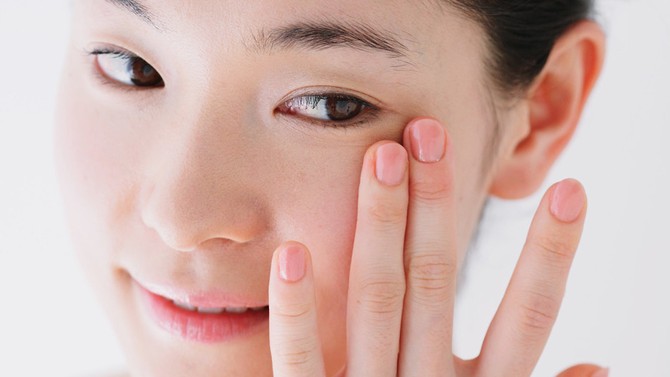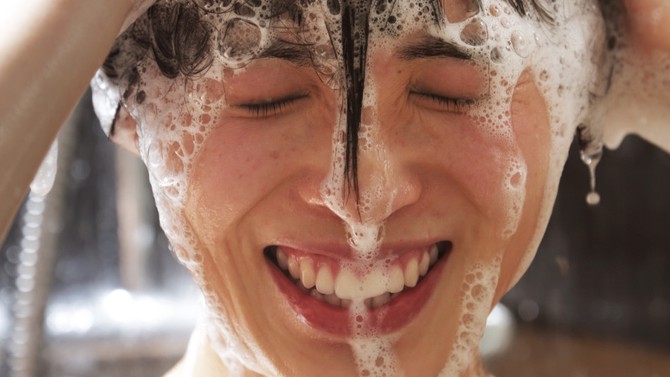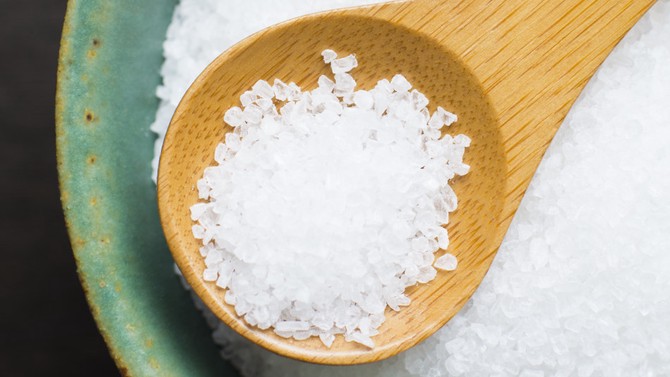4 Surprising Reasons for Under-Eye Bags
You regularly log 7 to 9 hours of sleep, aren't suffering through allergies and puffiness doesn't run in your family. So what gives? One of these culprits could be behind your eye baggage.
By Emma Haak

Photo: Yosuke Tanaka/Aflo/Getty Images
Your skincare routine is going out of bounds.
Retinol, salicylic acid, glycolic acid—all effective ingredients that can improve the look and feel of your complexion. But they can lead to irritation, and when used too close to your delicate eye area, that irritation can lead to bags. You rub to relieve the irritation, and that rubbing creates inflammation, which leads to leaky blood vessels. The fluid that seeps out finds its way to nearby tissue, creating puffiness and bags. Facial cleansing brushes (whether they're manual or electric) can also trigger the problem when used too close to the eyes, says Ellen Marmur, MD, associate clinical professor of dermatology and genetics and genomic research at Mt. Sinai Medical Center.
How to de-puff: Feel the bony area around your eye? That's your orbital bone, and potential irritants or tools shouldn't cross it.
How to de-puff: Feel the bony area around your eye? That's your orbital bone, and potential irritants or tools shouldn't cross it.

Photo: Peter Cade/The Image Bank/Getty Images
You're not doing a thorough job of rinsing your hair and face.
The most common cause of eyelid dermatitis (inflammation that can lead to rubbing and, eventually, bags) is shampoo, conditioner or facial-cleanser residue that gets trapped in the folds of your lids, says Matthew Zirwas, MD, director of the Contact Dermatitis Center at the Ohio State University Wexner Medical Center. Adding mascaras, eye shadows, and eye-makeup removers to the mix, with their preservatives and fragrances that can cause further irritation, only makes things worse. (It's less common, but mascaras, eye shadows and makeup removers can also cause dermatitis on their own.)
How to de-puff: Make sure you've gotten all shampoo, conditioner and cleanser off your face when you're done washing. And if you're prone to eye irritation, choose hypoallergenic personal-care and makeup products to minimize the chances of putting a known allergen near your eyes. One particular ingredient to avoid: methylisothiazolinone, a bacteria-fighting preservative often found in makeup-removing wipes that can cause allergy-like skin reactions. (It doesn't go by any other names, so it's easy to check for on product packaging.)
How to de-puff: Make sure you've gotten all shampoo, conditioner and cleanser off your face when you're done washing. And if you're prone to eye irritation, choose hypoallergenic personal-care and makeup products to minimize the chances of putting a known allergen near your eyes. One particular ingredient to avoid: methylisothiazolinone, a bacteria-fighting preservative often found in makeup-removing wipes that can cause allergy-like skin reactions. (It doesn't go by any other names, so it's easy to check for on product packaging.)

Photo: Kristin Duvall/Stockbyte/Getty Images
You're going heavy on the salt.
A high-sodium diet can make you retain water in weird places, including the area under your eyes, Marmur says. So, in addition to the less-obvious sodium sources you already know about (such as white bread, pizza and deli meats), your seemingly healthy snack of cottage cheese (a half-cup serving of 1 percent fat cottage cheese has roughly 450 mg of sodium—almost 20 percent of the daily recommended intake) and the soy sauce you liberally pour on your sushi may be causing your bags.
How to de-puff: The Dietary Guidelines for Americans recommends no more than 2,300 mg of sodium per day (or 1,500 mg if you're 51 years or older, African American, or have high blood pressure or diabetes). After the fact, eye creams that contain caffeine can help constrict blood vessels and shrink the bags. And if you can apply a cold compress to the area beforehand, all the better.
How to de-puff: The Dietary Guidelines for Americans recommends no more than 2,300 mg of sodium per day (or 1,500 mg if you're 51 years or older, African American, or have high blood pressure or diabetes). After the fact, eye creams that contain caffeine can help constrict blood vessels and shrink the bags. And if you can apply a cold compress to the area beforehand, all the better.

Photo: Image Source/Photodisc/Getty Images
You've dropped a few dress sizes.
You know that the aging process can make under-eye bags appear as your cheeks begin to droop a bit. But a quick slim-down can lead to the same problem. "Rapid weight loss causes you to lose volume in your cheeks, disrupting the smooth transition from the under eye to the cheek," Zeichner says.
How to de-puff: Try cold compresses as a quick, temporary fix for small bags, yet the least invasive but still effective option is fillers, which can restore volume to your cheeks and minimize the baggy look. If your bags are very pronounced or the skin is especially saggy, though, your dermatologist may refer to you an ocular plastic surgeon for a lower eyelift.
How to de-puff: Try cold compresses as a quick, temporary fix for small bags, yet the least invasive but still effective option is fillers, which can restore volume to your cheeks and minimize the baggy look. If your bags are very pronounced or the skin is especially saggy, though, your dermatologist may refer to you an ocular plastic surgeon for a lower eyelift.
Published 05/18/2015
Please note: This is general information and is not intended to be legal advice. You should consult with your own financial advisor before making any major financial decisions, including investments or changes to your portfolio, and a qualified legal professional before executing any legal documents or taking any legal action. Harpo Productions, Inc., OWN: Oprah Winfrey Network, Discovery Communications LLC and their affiliated companies and entities are not responsible for any losses, damages or claims that may result from your financial or legal decisions.

